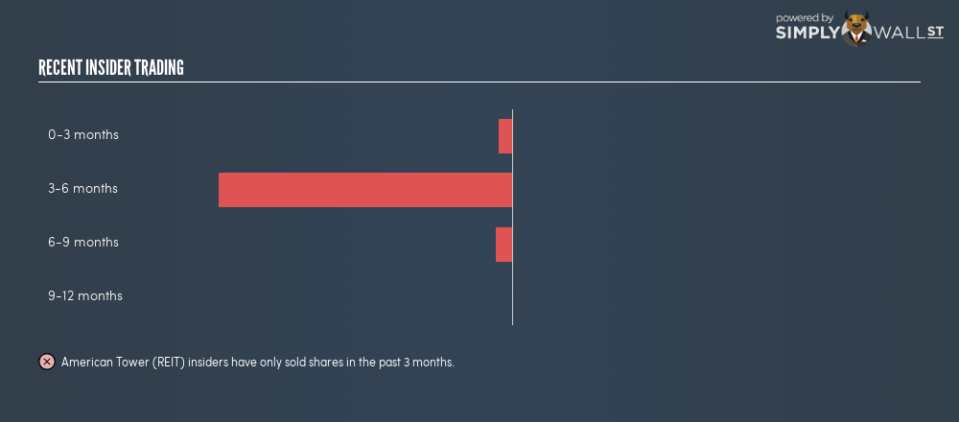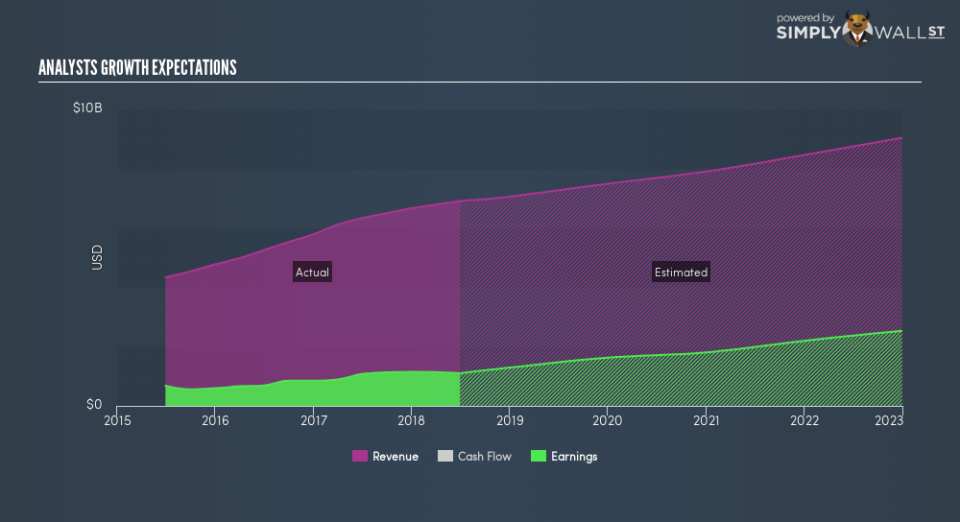Are Insiders Pessimistic About American Tower Corporation (REIT) (NYSE:AMT) Stock?

American Tower, one of the largest global REITs, is a leading independent owner, operator and developer of multitenant communications real estate with a portfolio of approximately 170,000 communications sites. American Tower (REIT)’s insiders have divested from 1.32k shares in the large-cap stock within the past three months. A well-known argument is that insiders divesting from their own companies’ shares sends a pessimistic signal. The MIT Press (1998) published an article showing that stocks following insider selling underperformed the market by 2.7%. But these signals may not be sufficient to gain confidence on whether to divest. Today we will evaluate whether these decisions are bolstered by analysts’ expectations of future growth as well as recent share price movements.
See our latest analysis for American Tower (REIT)
Who Are The Insiders?
More shares have been sold than bought by American Tower (REIT)’s insiders in the past three months. In total, individual insiders own less than one million shares in the business, or around 0.19% of total shares outstanding. The insider that recently sold more shares is David Sharbutt (board member) .
Is Future Growth Outlook As Bearish?
Analysts’ expectations for earnings over the next 3 years of 79.7% provides an optimistic outlook going forward. But this is not consistent with the signal company insiders are sending with their net selling activity. Digging deeper into the line items, American Tower (REIT) is expected to experience a limited level of revenue growth next year, but a suggestively greater level of expected earnings growth. This could indicate large cost-cutting initiatives by the company to boost its earnings. This may not be seen as a maintainable practice by insiders, who may expect a deterioration in earnings to reflect lower revenues growth in the future. Or they may merely view the stock as overvalued by the market which provides a suitable time to sell.
Can Share Price Volatility Explain The Sell?
An alternative reason for recent trades could be insiders taking advantage of the share price volatility. Volatility provides an opportunity to trade on market inefficiencies when the stock is under-priced compared to the stock’s intrinsic value. In the past three months, American Tower (REIT)’s share price reached a high of $151.17 and a low of $135.97. This suggests a trivial share price movement, with a change of 11.18%. This could indicate insider transactions are not driven by share price changes but perhaps they may simply want to diversify their holdings, distribute stock to investors, or simply require the cash for personal reasons.
Next Steps:
American Tower (REIT)’s net selling activity tells us the stock has fallen out of favour with some insiders as of late, however, this is rather cautious relative to analysts’ earnings expectation, and the share price movement may be too trivial to cash in on any mispricing. However it’s crucial to note that insider divesting may have nothing to do with their views on the company’s future performance. Furthermore, while insider transactions could be a helpful signal, it is definitely not sufficient on its own to make an investment decision. there are two fundamental aspects you should further research:
Financial Health: Does American Tower (REIT) have a healthy balance sheet? Take a look at our free balance sheet analysis with six simple checks on key factors like leverage and risk.
Other High Quality Alternatives : Are there other high quality stocks you could be holding instead of American Tower (REIT)? Explore our interactive list of high quality stocks to get an idea of what else is out there you may be missing!
NB: Figures in this article are calculated using data from the last twelve months, which refer to the 12-month period ending on the last date of the month the financial statement is dated. This may not be consistent with full year annual report figures.
To help readers see past the short term volatility of the financial market, we aim to bring you a long-term focused research analysis purely driven by fundamental data. Note that our analysis does not factor in the latest price-sensitive company announcements.
The author is an independent contributor and at the time of publication had no position in the stocks mentioned. For errors that warrant correction please contact the editor at editorial-team@simplywallst.com.


